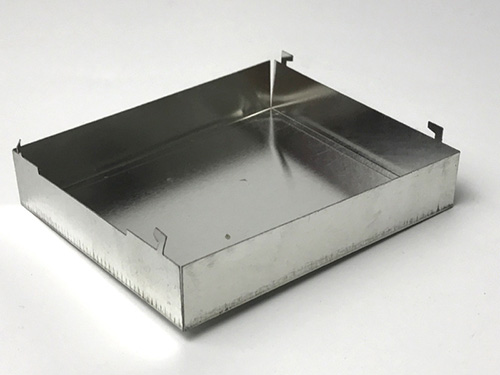
Jul 24, 2019

Chassis sheet metal parts are the chassis needed after the formation of cooling by using comprehensive cold processing technology for sheet metal(generally less than 6 mm).Processing technology includes shearing,punching,cutting,composite,folding,welding,riveting,splicing,forming(such as automobile body)and so on.Its remarkable feature is that the thickness of the same part is the same.With the application of sheet metal more and more widely,the design of sheet metal parts has become an important part of product industrial development.Mechanical engineers must be skilled in the design of sheet metal parts.
Processing Technology
According to the basic processing methods of sheet metal parts,such as material,bending,stretching,forming and welding.This specification describes the process requirements that should be paid attention to in each processing mode.
1.Cutting
According to the different processing methods,cutting can be divided into general punching,digital punching,cutting machine,laser cutting,wind cutting.Because of the different processing methods,the processing technology of cutting is also different.The main cutting methods of sheet metal are punching and laser cutting.
2.Bending
When the material is bent,the outer layer is stretched and the inner layer is compressed.When the thickness of the material is constant,the smaller the inner r,the more serious the tension and compression of the material.When the tensile stress of the outer corner exceeds the ultimate strength of the material,cracks and breaks will occur.Therefore,in the structural design of bending parts,too small bending radius should be avoided.
3.Tension
The radius of the corner between the bottom and the straight wall of the stretching part should be larger than the thickness of the plate,that is,R1(>t).In order to make the stretching process more smoothly,r1=(3~5)t is usually chosen,and the maximum radius of the fillet should be less than or equal to 8 times the thickness of the plate,that is,R1<8t.Due to the different stress magnitude,the thickness of the material after tension will change.Generally speaking,the material at the bottom center keeps its original thickness,the material at the bottom corner becomes thinner,the material near the flange at the top becomes thicker,and the material at the corner around the rectangular stretching piece becomes thicker.
4.Forming
Pressing ribs on plate metal parts helps to increase structural rigidity.Louvers are usually used for ventilation and heat dissipation on various shells or chassis.The forming method is to cut the material through one edge of the punch,while the rest of the punch deforms the material by drawing at the same time to form a undulating shape of the opening at one side.
5.Welding
The main welding methods are arc welding,electroslag welding,gas welding,plasma arc welding,melting welding,pressure welding,brazing.The welding of sheet metal products is mainly arc welding and gas welding.
Arc welding has the advantages of flexibility,mobility,wide applicability,all-position welding,simple equipment,good durability and low maintenance cost.However,the labor intensity and quality are not stable,depending on the level of operators.The flame temperature and properties of non-ferrous alloy gas welding flame suitable for welding more than 3mm carbon steel,low alloy steel,stainless steel,copper and aluminium can be adjusted.The heat source of arc welding is wider than the heat affected zone,and the heat is not as concentrated as that of arc welding.The productivity is low.It can be used for welding thin-walled structures and small parts,such as weldable steel,cast iron,aluminium,copper and its alloys.Alloys,etc.
